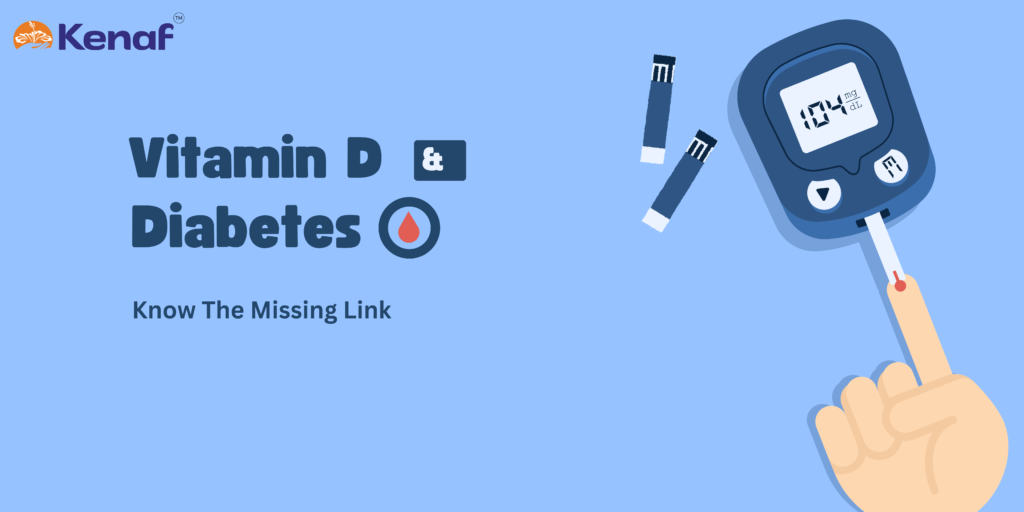Vitamin D and Diabetes – Introduction
Diabetes is a prevalent chronic disease affecting millions of people worldwide and is a global health concern. While various factors contribute to its development, identifying effective strategies for preventing this metabolic disorder is crucial. Recent research has shed light on the potential role of vitamin D in diabetes prevention and management.

Understanding Vitamin D and its Role:
Vitamin D, often referred to as the “sunshine vitamin,” is synthesized in the skin upon exposure to sunlight. It plays a crucial role in maintaining bone health and supporting the proper functioning of the immune system. Vitamin D help to regulate more than 2000 genes of our body thus, may have beneficial role from brain to bone inducing the management and prevent of diabetes.
In this blog post, we delve into the connection between vitamin D supplementation and diabetes, exploring the potential benefits and implications.
The Relationship between low Vitamin D status and Diabetes:
While, low levels if Vitamin D is highly prevalent across the globe, research has revealed a correlation between low vitamin D levels and an increased risk of developing type 2 diabetes. Studies have shown that individuals with insufficient vitamin D levels may be more prone to insulin resistance and impaired glucose metabolism. Consequently, optimizing vitamin D levels through supplementation has garnered interest as a potential strategy for diabetes prevention and management.
Vitamin D Supplementation and Diabetes Prevention:
Several studies have explored the effects of vitamin D supplementation on diabetes prevention, particularly in individuals at risk, such as those with prediabetes or a family history of diabetes. While findings are not yet definitive, there is emerging evidence suggesting a potential protective effect of vitamin D supplementation in reducing the risk of developing type 2 diabetes. Here are some potential benefits which might help in better management of diabetes.
- Improved Insulin Sensitivity and Glucose Regulation:
One proposed mechanism behind the potential benefits of vitamin D supplementation is its role in improving insulin sensitivity. Insulin resistance is a hallmark of type 2 diabetes, and vitamin D may help enhance the body’s response to insulin, leading to better glucose regulation. However, further research is needed to fully understand the complex relationship between vitamin D and insulin function.
- Reduced Risk of Type 2 Diabetes:
Observational studies have found an inverse relationship between vitamin D levels and the risk of developing type 2 diabetes. Individuals with higher vitamin D levels tend to have a lower risk of developing diabetes compared to those with lower levels.
- Better Glycemic Control:
Several studies have investigated the effects of vitamin D supplementation on glycemic control in individuals with diabetes. Some research suggests that adequate vitamin D levels may contribute to better blood sugar management and glycemic control. However, the findings are not consistent across all studies, and more research is needed to fully understand the relationship between vitamin D supplementation and glycemic control.
- Improved Cardiovascular Health:
Diabetes is associated with an increased risk of cardiovascular complications. Vitamin D supplementation may have beneficial effects on cardiovascular health by reducing inflammation, improving blood vessel function, and lowering blood pressure. These effects may contribute to the overall management of diabetes and reduce the risk of cardiovascular complications.
- Better Bone Health:
People with diabetes are at a higher risk of developing osteoporosis and fractures. Vitamin D is essential for calcium absorption and bone health. By ensuring adequate vitamin D levels through supplementation, individuals with diabetes can support their bone health and reduce the risk of fractures.
Considerations and Recommendations:
While vitamin D supplementation shows promise, it is important to approach it as part of a comprehensive diabetes management plan. Lifestyle factors, such as a healthy diet and regular physical activity, remain crucial in preventing and managing diabetes. Additionally, consulting with healthcare professionals is vital to determine appropriate dosages and individualized treatment plans.
Sunlight, Diet, and Supplementation:
It’s worth noting that while sunlight is a natural source of vitamin D, various factors, including geographical location, season, and skin pigmentation, can affect the body’s ability to produce adequate vitamin D. Consequently, dietary sources and supplementation may be necessary to maintain optimal levels, particularly for individuals at risk of vitamin D deficiency. Best time of have Vitamin D supplementation is in the morning time along with breakfast as this helps in better absorption of the supplementation. If you want to bask yourself in sunlight to maintain optional Vitamin D levels, then the ideal time us between 10 am to 3 pm.
Several governing bodies have recommended daily 1000 – 2000 IU Vitamin D for adults which is generally considered safe and can help to offer multiple health benefits.
Kenaf’s Vitamin D mouth dissolving films contains natural Vitamin D 2000 IU which can be consumed anywhere and does not require water to swallow as they dissolve instantly on the month making them easy to swallow. Mouth dissolving Vitamin D films are sugar free and a convenient way to maintain your serum Vitamin D levels and it may be best if you can get in the routine of taking your Vitamin D supplement with a nutritious breakfast.
Conclusion:
While more research is needed to fully understand the relationship between vitamin D supplementation and diabetes, the available evidence suggests a potential benefit in diabetes prevention and management. However, it is important to approach vitamin D supplementation as part of a holistic approach to diabetes care, including lifestyle modifications and professional guidance. By staying informed and working closely with healthcare professionals, individuals can make informed decisions regarding vitamin D supplementation and its potential role in diabetes prevention and management.
Disclaimer:
Thank you for reading our blog. If you have any questions or concerns, please contact us through our website.
The information provided on this blog is for general informational purposes only. The information provided on this blog is not intended to be a substitute for professional medical advice, diagnosis, or treatment. Always seek the advice of your physician or other qualified health provider with any questions you may have regarding a medical condition. Never disregard professional medical advice or delay in seeking it because of something you have read on this blog.
Reference:
1- Holick MF. Vitamin D deficiency. N Engl J Med. 2007;357(3):266-281.
2- Pittas AG, Lau J, Hu FB, Dawson-Hughes B. The role of vitamin D and calcium in type 2 diabetes. A systematic review and meta-analysis. J Clin Endocrinol Metab. 2007;92(6):2017-2029.
3- Song Y, Wang L, Pittas AG, et al. Blood 25-hydroxy vitamin D levels and incident type 2 diabetes: a meta-analysis of prospective studies. Diabetes Care. 2013;36(5):1422-1428.
4- Mitri J, Dawson-Hughes B, Hu FB, Pittas AG. Effects of vitamin D and calcium supplementation on pancreatic β cell function, insulin sensitivity, and glycemia in adults at high risk of diabetes: the Calcium and Vitamin D for Diabetes Mellitus (CaDDM) randomized controlled trial. Am J Clin Nutr. 2011;94(2):486-494.
5- Mirhosseini N, Vatanparast H, Mazidi M, Kimball SM. The effect of improved serum 25-hydroxyvitamin D status on glycemic control in diabetic patients: a meta-analysis. J Clin Endocrinol Metab. 2017;102(9):3097-3110.




